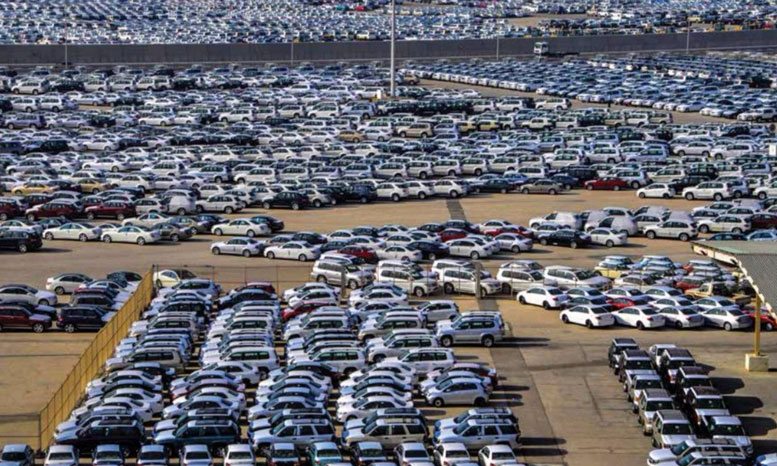Reversing the slump in GCC vehicle sales
Alpen Capital feels positive about a future built on local assembly and rebounding sales

A new report by Alpen Capital, an investment banking advisory firm, says vehicle sales are likely to continue to be sluggish in 2017 before a potential rebound in 2018.
“The GCC automobile sector is dynamic and one of the faster growing sectors in the world, primarily owing to the growing population and high disposable income coupled with significant infrastructure developments in the region,” says Sameena Ahmad, Managing Director, Alpen Capital.
“The sector however is currently facing a slowdown amid a weak economic environment and low oil prices as consumers scale back new car purchases. Passenger Car sales will remain under pressure in 2017 but are likely to rebound in 2018 and thereon grow at a stable pace in anticipation of a recovery in oil. Other factors fuelling growth include increasing disposable income, growing population and availability of attractive financing options in the country,” says Ahmad.
“We are witnessing a lot of activity in the automotive manufacturing sector as well as possibilities of M&A transactions resulting in consolidation. Hence, despite a recent slowdown in demand for automobiles in the backdrop of sluggish economic conditions, the GCC region continues to offer immense opportunities in the areas of automotive manufacturing, aftermarket, and new technology development.
New passenger car sales are projected at 1.4 million in 2020, compared to 1.2 million in 2015. Although new sales declined in 2016 and will be under pressure in 2017, we expect to see steady growth starting 2018 as the economic environment stabilises and creates pent-up demand. The anticipated growth is slower compared to that during last five years in view of the near-term softness in economic activity, as consumers tighten discretionary spending and delay buying new cars.
“Inherent growth drivers such as an expanding and well-heeled consumer base, high urbanisation rate, government investments to boost domestic manufacturing and the significant upcoming infrastructure and tourism developments are likely to driving demand for vehicles in the region over a long term and lead to a steady growth in the GCC automobile sector,” says Krishna Dhanak, Executive Director, Alpen Capital (ME) Limited
Industry Outlook
According to Alpen Capital, the number of passenger cars in use in the GCC is expected to grow at a 5.0% CAGR from an estimated 10.3 million in 2015 to 13.2 million in 2020. New passenger car sales are projected at 1.4 million in 2020, compared to 1.2 million in 2015. Although new sales declined in 2016 and will be under pressure in 2017. It expects to see steady growth starting 2018 as the economic environment stabilises and creates pent-up demand. This is slower compared to that during last five years in view of the near-term softness in economic activity, as consumers tighten discretionary spending and delay buying new cars.
Between 2015 and 2020, passenger cars in use in the GCC countries is anticipated to register an annual average growth rate ranging from 3.6%-5.4%. Saudi Arabia, UAE, and Kuwait collectively are expected to continue holding more than 75% of the region’s passenger car fleet in 2020.
New car sales in the UAE are projected to grow at an annualised rate of 4.5% to over 267,000 in 2020 from an estimated 214,000 in 2015.
Sales of new cars in Saudi Arabia is likely to reach nearly 743,000 in 2020, suggesting a suggesting a CAGR of 2.0% from 2015. The remaining GCC countries will register a CAGR ranging from 1.8% to 2.1%.
The GCC population is expected to increase at a CAGR of 2.4% between 2015 and 2020. An expanding consumer base is likely to translate into higher demand for new as well as used vehicles and related parts in the region.
In addition to the size, the wealth of the population also tends to have a large influence on the demand for vehicles. Despite the projection of a decline in real GDP in 2016, it is forecasted to improve and remain almost steady across the member nations during 2017-2020. A growing economy is likely to translate into increase in disposable income. The wealth of the affluent section in the Middle East is expected to grow at an annualised rate of 6.7% during 2015-2025.
The cost of vehicle ownership in the GCC is lower compared to other countries globally, due to a favourable tax structure. Additionally, attractive insurance and financing options makes it easier to own a car in the GCC.
Key trends in the market
One of the key drivers of the automotive industry in the GCC is availability of low-cost fuel. Large proven crude oil reserves have enabled the member countries to offer fuel at subsidised rates. Although these oil-based economies have recently resorted to raising energy prices in a bid to reduce subsidies, the cost of fuel is still much below the global average. Fuel price reforms are a part of the broader programme of the GCC governments on subsidy cuts. The increase in prices of petrol amid a sluggish economic environment is likely to negatively impact the demand for vehicles.
Automobile dealers in the Gulf come up with several promotional activities to lure car buyers during annual festivals/events. Such seasonal promotions would continue to boost vehicle sales in the region.
The public transport system still in a development phase in the GCC has remained an important driver of vehicle sales. Increasing road congestions are a testament to the dependency on motor vehicles in the region.
As of July 2016, infrastructure projects worth US$ 407.9 billion were in various stages of construction in the region. The UAE and Qatar have many projects under development ahead of their mega events namely, World Expo 2020 and FIFA World Cup 2022, respectively. The ongoing developments are likely to accelerate demand for trucks and other heavy vehicles for use in the construction and logistics activities.
Tourist arrivals in the GCC are anticipated to grow at an annualised rate of 5.7% during 2015-2020. This is likely to stimulate demand for vehicles from car rental and travel companies.
The persistent softness in oil prices has disrupted the largely oil-dependent GCC economies and widened their fiscal deficits to an all-time high. The challenging macroeconomic environment is having an adverse impact on automobile sales.
The presence of several dealers makes the GCC automobile market highly competitive, resulting in price sensitivity and low brand loyalty among consumers. Existence of a thriving used-car market is also adding to the competitive pressures on new automobile dealers in the region. The authorised car dealers in the UAE are facing the heat from grey imports, which in certain cases affects the dealer’s volumes by around 20%.
The Japanese Yen has appreciated nearly 16% against the US Dollar since the beginning of this year. Being the largest source market for vehicle imports, strengthening of Yen is likely to make imports costlier for the GCC countries. Similarly, appreciation of Euro or the Korean Won can have an adverse impact on the GCC vehicle imports. While the Japanese brands of vehicles remain popular in the GCC and the high-end market continues to be dominated by European makes, Chinese brands are fast closing the gap with low pricing and less maintenance cost. Buyers as well as dealers are also increasingly pleased with the performance of these brands in terms of technology, quality, and safety. Chinese vehicle sales in the UAE are forecasted to rise by 100% annually to capture a double-digit market share by 2020.
Recall of vehicles owing to certain manufacturing issues has a negative influence on the brand loyalty and reputation of automakers, thereby affecting sales.
In the GCC automobile sector, government regulations such as the law of one dealer per automobile manufacturer in the UAE act as barriers to entry. A limited pool of local talent, alongside the increasing emphasis on nationalisation of jobs, is posing a challenge for the region’s automobile industry.
The increased regulatory oversight on emissions, in view of rising environmental concerns over global warming, is adding to the compliance and technology costs for the automobile manufacturers, ultimately making the vehicles more expensive.
Presently there are a limited number of vehicle manufacturers in the GCC. However, the situation is possibly going to change in the future, as Saudi Arabia, the UAE, and Oman are receiving investments to set up automotive manufacturing plants. The governments are also providing incentives and devising plans to establish regional automobile manufacturing hubs. Additionally, the increasing number of vehicles coupled with hot climatic conditions and a rugged terrain, which affects the lifespan of tires and batteries, has created a thriving automotive aftermarket in the region. An already ageing vehicle fleet, with the tendency of owners holding on to their cars for a longer duration amid the challenging economy is likely to accelerate demand for parts and services. The UAE is also witnessing a growing trend of vehicle customisation, as can be seen by the growing number of car accessory outlets across the country. Additionally, a persistent demand for car wrapping from companies for advertorial purpose is likely to support the trend in vehicle customisation.
Rising number of tech-savvy people and use of social media for reviews and recommendations have encouraged the automobile dealers to establish online presence. On the other hand, internet combined with new technologies is revolutionising the automobile industry, with the advent of connected vehicles. Mobile application-based taxi-hailing service providers are gaining presence in the GCC. Uber, which entered the GCC market in 2013 by launching its services in Dubai, has now grown its presence in other major cities in the region.
Although vehicle sales in the GCC remained subdued during 2016 and will be under pressure in 2017, the automobile sector is poised for growth in the coming years to 2020 as the region adds more people and vehicles to its population, reinstates economic growth, and invests in new manufacturing units and infrastructure development.
New launches
2017 TOYOTA LAND CRUISER TRD
Toyota Middle East presented the 2017 Toyota Land Cruiser TRD, based on the top-end Land Cruiser 5.7L VXE, at last month’s Oman Motor Show. It features exclusive TRD accessories both outside and inside that refine the bold appearance of the Land Cruiser. The naturally aspirated V8 petrol engine comes loaded with a dual VVT-i paired with an 8-speed multi-mode auto transmission that produces 362 hp and 54 kg/m of peak torque. The Land Cruiser TRD comes exclusively equipped with a TRD suspension kit tuned for desert driving, and the ride height has been increased by 25 mm.
VOLKSWAGEN 2017 ATLAS
VW’s new 7-seater Atlas SUV looks set for a summer release. The Atlas will arrive with a choice of either a 2.0-litre four-cylinder turbocharged unit producing 175kW, or a 3.6-litre V6 engine which boosts performance to 206kW. The Atlas comes with an eight-speed automatic all-wheel drive (AWD) system the optional 4Motion AWD for the V6.
HONDA 2017 CIVIC1.6L
Honda has launched a new 1.6L engine variant of its 2017 Civic in the GCC, Lebanon and Jordan. The 1.6-litre Civic comes in two classes, the DX and LX. Honda says that the 2016 Civic that rolled out in April last year with 2.0l and 1.5l turbo forms have led to an 86% increase in yearly Civic sales at a time.
VOLKSWAGEN TIGUAN R-LINE PACKAGES
Volkswagen Middle East has introduced the sporty looking R-Line packages for its compact SUV , The R-Line packages have been developed by Volkswagen R for the Tiguan SE 2.0L, SEL 2.0L and Sport 2.0L models to enhance their visual appeal.



















